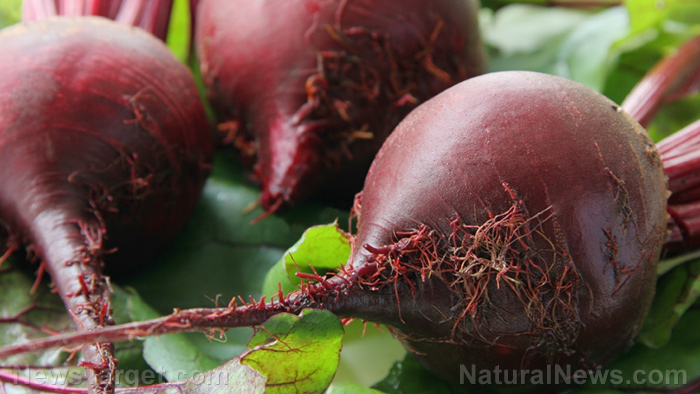by Joanne Washburn
Beets are a unique root vegetable known for their impressive nutritional profile and health benefits. Rich in fiber, vitamins, minerals and antioxidants, beets support your overall health in many ways. Beets are also easy to incorporate into your diet.
Here are five good reasons to eat more beets. (h/t to BBCGoodFood.com)
- May help prevent cancer
Beets get their vibrant red color from betacyanin, a potent compound thought to protect against some kinds of cancer, including bladder cancer. Beets also contain high levels of antioxidants like carotenoids, which help protect cells from oxidative stress and free radical damage, both of which have been associated with cancer.
- Helps lower blood pressure levels
Beets are a good source of nitrates, which your body converts to nitric oxide (NO). This compound relaxes your blood vessels so that nutrient- and oxygen-rich blood can flow more easily. That means healthier blood pressure levels as well.
In a 2012 study, Australian researchers found that men who drank one glass of beet juice lowered their systolic blood pressure temporarily by an average of four to five points. In another small study, Italian researchers found that drinking beet juice led to a 10 millimeters of mercury (mm Hg) drop in blood pressure.
- Improves exercise performance
NO promotes optimal blood circulation and muscle contraction, which are important during exercise. As a rich source of NO precursors, beets can help athletes and fitness enthusiasts maximize their workouts. This is why beet juice is a popular post-workout drink. Additionally, beets help your muscles recover after a workout by helping to deliver more oxygen to muscle cells.
- Helps lower inflammation
Beets contain plant pigments called betalains, which have been shown to help reduce inflammation. They help protect cells from damage as well. Additionally, beets are rich in vitamin C, which also helps fight inflammation. Vitamin C is also known for keeping your immune system healthy.
- Supports digestion
Beets are one of the richest sources of glutamine, the most abundant free amino acid in your body. It is critical to the health and maintenance of your gut. Glutamine is also the main fuel source for your body’s lymphocytes – the white blood cells that fight infection and disease.
Beets also contain insoluble fiber. This type of fiber promotes regular bowel movement by adding bulk to stools so that it’s easier to pass through the intestines.
Take note that eating beets can cause your stools and urine to look reddish or pinkish. If you have recently had beets and notice a reddish color to your stool or urine without experiencing unusual symptoms, don’t be alarmed. It’s completely harmless.
Recipe for roasted beet salad
Beets are known for their earthy and mildly bitter flavor. If you’re not a fan of that flavor, boil beets in a pot of salted water or dress them with balsamic or red wine vinegar. Beets are also easier to enjoy when they are paired with bright, sweet and savory flavors. This recipe for a simple roasted beet salad has all of those flavors.
Ingredients:
2 pounds fresh beets, scrubbed and washed
1/2 cup crumbled feta cheese
3 Tablespoons olive oil, divided
3 Tablespoons thyme or oregano, chopped
2 Tablespoons balsamic vinegar
1/4 Tablespoon pine nuts
Ground black pepper
Salt
Preparation:
- Preheat the oven to 450 F.
- Cut and discard the tops and bottoms of the beets. Place in a baking dish and season with a pinch of salt, black pepper and 1 tablespoon of olive oil on all sides.
- Cover the dish with aluminum foil and bake for 45 to 55 minutes or until tender. Set aside to cool.
- Meanwhile, place the pine nuts in a pan and toast over medium-low heat. Shake the pan constantly until the nuts are fragrant and golden brown. Once done, transfer to a small bowl.
- Lightly peel the roasted beets, then cut them into one-inch cubes. Place in a salad bowl.
- Add the feta cheese, pine nuts, remaining olive oil, vinegar and thyme or oregano. Toss to combine, then season with salt and black pepper to taste. Serve and enjoy.



